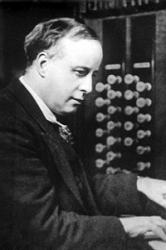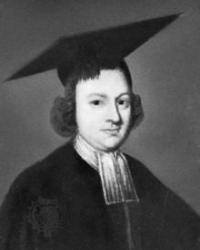Planning worship?
Check out our sister site, ZeteoSearch.org,
for 20+ additional resources related to your search.
- |
User Links
Person Results
John Henry Newman

1801 - 1890 Person Name: J. H. Newman (1801-1890) Author of "Firmly I believe and truly" in Hymns for Today's Church (2nd ed.) Newman, John Henry , D.D. The hymnological side of Cardinal Newman's life and work is so small when compared with the causes which have ruled, and the events which have accompanied his life as a whole, that the barest outline of biographical facts and summary of poetical works comprise all that properly belongs to this work. Cardinal Newman was the eldest son of John Newman, and was born in London, Feb. 21, 1801. He was educated at Ealing under Dr. John Nicholas, and at Trinity College, Oxford, where he graduated in honours in 1820, and became a Fellow of Oriel in 1822. Taking Holy Orders in 1824, he was for a short time Vice-Principal of St. Alban's Hall, and then Tutor of Oriel. His appointment to St. Mary's, Oxford, was in the spring of 1828. In 1827 he was Public Examiner, and in 1830 one of the Select University Preachers. His association with Keble, Pusey, and others, in what is known as "The Oxford Movement," together with the periodical publication of the Tracts for the Times, are matters of history. It is well known how that Tract 90, entitled Bernards on Certain Passages in the Thirty-nine Articles, in 1841, was followed by his retirement to Littlemore; his formal recantation, in February, 1843, of all that he had said against Rome; his resignation in September of the same year of St. Mary's and Littlemore; and of his formal application to be received into the communion of the Church of Rome, Oct. 8, 1845. In 1848 he became Father Superior of the Oratory of St. Philip Neri, at Birmingham; in 1854 Rector of the newly founded Roman Catholic University at Dublin; and in 1858 he removed to the Edgbaston Oratory, Birmingham. In 1879 he was created a Cardinal, and thus received the highest dignity it is in the power of the Pope to bestow. Cardinal Newman's prose works are numerous, and his Parochial Sermons especially being very popular. His Apologia pro Vita Sua, 1864, is a lucid exposition and masterly defence of his life and work.
Cardinal Newman's poetical work began with poems and lyrical pieces which he contributed to the British Magazine, in 1832-4 (with other pieces by Keble and others), under the title of Lyra Apostolica. In 1836 these poems were collected and published under the same title, and Greek letters were added to distinguish the authorship of each piece, his being δ. Only a few of his poems from this work have come into use as hymns. The most notable is, "Lead, kindly Light". His Tract for the Times, No. 75, On the Roman Breviary, 1836, contained translations of 14 Latin hymns. Of these 10 were repeated in his Verses on Religious Subjects, 1853, and his Verses on Various Occasions, 1865, and translations of 24 additional Latin hymns were added. Several of these translations are in common use, the most widely known being "Nunc Sancte nobis" ("Come, Holy Ghost, Who ever One"). His collection of Latin hymns from the Roman and Paris Breviaries, and other sources was published as Hymni Ecclesiae, in 1838, and again in 1865. His Dream of Gerontius, a poem from which his fine hymn, "Praise to the Holiest in the height," is taken, appeared in his Verses on Various Occasions, in 1868. Cardinal Newman's influence on hymnology has not been of a marked character. Two brilliant original pieces, and little more than half a dozen translations from the Latin, are all that can claim to rank with his inimitable prose.
--John Julian, Dictionary of Hymnology (1907)
=================
Newman, John Henry, p. 822, ii. He died at Edgbaston, Birmingham, Aug. 11, 1890.
--John Julian, Dictionary of Hymnology, Appendix, Part II (1907)
==============
Newman, Card. J. H., pp. 802, ii.; 1581, ii. The following are also in use at the present time, but, except No. 13, almost exclusively in R. C. collections. The dates in brackets are those given in Newman's Verses, 1868; all thus marked were composed in the Birmingham Oratory at these dates:—
i. In the Rambler, 1850.
1. In the far North our lot is cast. [S. Philip Neri.] (1850.) March, 1850, p. 250. In the Birmingham Oratory Hymn Book, 1857 and 1906, it begins, " On Northern coasts," and in the Parochial Hymn Book, 1880, with st. ii. " Founder and Sire! to mighty Rome."
2. The Angel-lights of Christmas morn. [Candlemas.] (1849.) March, 1850, p. 251.
3. There sat a Lady all on the ground. [B. V. M.] (1849.) May, 1850, p. 425.
ii. Verses, 1853.
4. All is Divine which the Highest has made. [For an inclement May.] (1850.) 1853, p. 128.
5. Green are the leaves, and sweet the flowers. [May.] (1850.) 1853, p. 125.
6. My oldest friend, mine from the hour. [Guardian Angel] (1853.) 1853, p. 12.
7. The holy monks conceal'd from men. [S. Philip Neri.] (1850.) 1853, p. 134.
8. The one true Faith, the ancient Creed. [The Catholic Faith.] 1853, p. 140.
9. This is the saint of sweetness and compassion. [S. Philip Neri.] 1853, p. 136. Rewritten (1857) as "This is the saint of gentleness and kindness" in the Birmingham Oratory Hymn Book, 1857, No. 49.
iii. Birmingham Oratory Hymn Book, 1857.
10. Help, Lord, the souls which Thou hast made. [The Faithful Departed.] (1857.) 1857, No. 76.
iv. Birmingham Oratory H. Book, 1862.
11. I ask not for fortune, for silken attire. [S. Philip Neri.] (1857.) 1862, No. 54.
12. Thou champion high. [S. Michael.] (1862.) 1862, No. 41.
v. Dream of Gerontius, 1866.
13. Firmly I believe and truly. [The Faith of a Christian.] 1866, p. 9; Verses, 1868, p. 318; The English Hymnal 1906. [Rev. James Mearns, M.A.]
--John Julian, Dictionary of Hymnology, New Supplement (1907)
-----
John Henry Newman was born in London, in 1801. He studied at Trinity College, Oxford, graduating B.A. in 1820, and was subsequently Fellow of Oriel College. In 1825, he became Vice Principal of S. Alban's Hall, and was Tutor of his college for several years. In 1828, he became incumbent of S. Mary's, Oxford, with the chaplaincy of Littlemore. In 1842, he went to preside over a Brotherhood he had established at Littlemore. He was the author of twenty-four of the "Tracts for the Times," amongst them the celebrated Tract No. 90, which brought censure upon its author. In 1845, he left the Church of England and entered the Church of Rome. He was appointed Father Superior of the Oratory of S. Philip Neri, at Birmingham, and in 1854, Rector of the new Roman Catholic University at Dublin, an office he filled till 1858. He has published a large number of works.
--Annotations of the Hymnal, Charles Hutchins, M.A. 1872.
====================
John Henry Newman
Alan Gaunt
1935 - 2023 Person Name: Alan Gaunt (b. 1935) Author of "Lord, if faith is disenchanted" in Ancient and Modern
Alan Gaunt
Henry G. Ley

1887 - 1962 Person Name: H. G. Ley (1887-1962) Composer of "OTTERY ST. MARY" in Hymns for Today's Church (2nd ed.) Born: December 30, 1887, Chagford, Devonshire, England.
Died: August 24, 1962, near Ottery, Devonshire, England.
Ley trained as a chorister at St. George’s Chapel, Windsor, as a music scholar at Uppingham, the Royal College of Music, and as an organ scholar at Keble College, Oxford. He was Precentor of Radley College; organist at Christ Church Cathedral, Oxford (1909-26); Choragus of the University, Oxford; professor of the organ at the Royal College of Music (1919); and organist at Eton College.
Sources:
Frost, p. 680
West, p. 87
http://www.hymntime.com/tch/bio/l/e/y/ley_hg.htm
Henry G. Ley
Christopher Smart

1722 - 1771 Person Name: Christopher Smart, 1722-71 Author of "Where is this stupendous stranger?" in The New English Hymnal Smart, Christophe, M.A., was born at Shipburn, Kent, in 1722, and educated at Pembroke Hall, Cambridge, where he gained the Seatonian prize for five years, four of which were in succession, (B.A. 1747.) He removed to London in 1753, and gave some attention to literature: but neglecting both his property and his constitution, he became poor and insane. He died in the King's Bench, 1771. His Poems were published in 2 vols. in 1771. From that work "Father of light conduct my feet" (Divine Guidance), and "I sing of God the mighty Source" [God the Author of All), have been taken.
--John Julian, Dictionary of Hymnology (1907)
Christopher Smart
L. I. Gentle
1904 - 1988 Author of "Sankta Dio, kun kompato" in Esperanta Himnaro Leonard Ivor Gentle, an Englishman, was for 26 years the organist of the Londona Esperanta Diservo, for many years the best known Esperanto Protestant worship meeting. Four of his works appear in Adoru, and many others are accessible at the archived versions of TTT-Himnaro Cigneta (http://reocities.com/cigneto/thcbio/g/gentle_li.html)
Leland Ross
L. I. Gentle
Isabel G. V. de Rodríguez
1894 - 1975 Person Name: Isabel González Vásquez de Rodríguez Author of "Este Templo Dedicamos" in Hinário para o Culto Cristão Isabel González Vásquez de Rodríguez, 1894-1975, worked along side her husband, who was a pastor in Uruguay and Argentina. She was an educator and speaker, helped establish women's societies in the churches they served, advocated for homeschooling, and fought against alcoholism and other vices. She wrote some books and several hymns.
Dianne Shapiro, from Celebremos Su Gloria (Cúcata, Colombia: Libros Alianza, 1992, p. 586
Isabel G. V. de Rodríguez
João Soares da Fonseca
Translator of "Este Templo Dedicamos" in Hinário para o Culto Cristão
João Soares da Fonseca


 My Starred Hymns
My Starred Hymns


